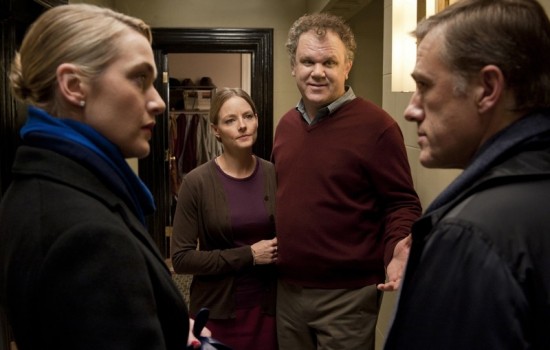Carnage: Roman Polanski – comedy of bourgeois manners and sensibilities

The Carnage ensemble
![]()
Carnage – Roman Polanski
Why? – must be the first question that comes to mind when adapting a work from another medium to film. The most obvious answer is the commercial hedge it represents to take a work with a proven track record of success. French dramatist Yasmina Reza’s play Le Dieu du Carnage was a hit all over the world from its premier in Paris through a run at The National all the way to Broadway.
Other, perhaps better reasons might be because the original can be opened out; or perhaps the forensic intimacy film can bring may develop and deepen characters. The challenge in adapting a play to the screen is perhaps opposite to that presented by a book: while a book notoriously has to be edited and abbreviated; the play invites an opening out, especially of place and setting; and perhaps more intense exploration of character.
Polanski’s Carnage (I have no idea what ‘The God of’ meant) is an 80 minute filmed play. Apart from opening and closing scene setting shots in a Brooklyn park everything takes place in the flat of Michael and Penelope Longstreet (John C. Reilly and Jodie Foster) parents of 12-year-old Ethan who has been whacked in the mouth with a stick by schoolmate Zachary Cowan whose parents Nancy and Alan (Kate Winslett and Christoph Waltz) have come round ostensibly to apologise for Zachary’s behaviour and commiserate with Ethan’s parents about the resultant loss of two of Longstreet Junior’s teeth.
What follows is a comedy of manners where polite, politically correct middle-class attitudes and sensibilities begin to break down under the conflicting stresses of maternal protectiveness, ambivalent paternal attitudes and the chronic but very different unspoken problems that are revealed in the marriages of the two sets of protagonists.
The Longstreets are a very odd couple: Penelope’s idealistic pinkish liberal social conscience an uncomfortable bedfellow to Michael’s small-time plumbing-business, pale blue-collar male chauvinism. Better heeled but no better matched, Winslett’s financial city type struggles with the ironic, amoral cynicism of Alan’s corporate Lawyer, umbilically linked to his Blackberry with which he is intermittently damage-limiting throughout the action, the harmful effects of a drug his main corporate client markets.
Penelope’s holier-than-thou OTT judgmentalism about the stick-whacking incident eventually dissolves the thin carapace of unconvincing politeness the Cowans are affecting; and under the beneficial emotionally releasing effects of a liberally imbibed 18 year-old single malt Scotch, things begin to warm up: after that is, Nancy has projectile vomited Penelope’s excessively praised Fruit Cobbler over its creator’s precious books.
As far as it goes this is entertaining enough with some excellent ensemble playing flattering to disguise some relatively thin ideas, well enough to raise a few good laughs. However with only 80 minutes to play with, so to speak, the opening 30 minutes or so are pretty slow because paradoxically, the stifled, polite, middle class evasions are played so accurately – they aren’t, by definition, very interesting.
Waltz’s deliciously characteristic, Col. Hans Landa-ish (Inglourious Bastards) wry, ironic cynicism is a pleasure throughout but the other three don’t really get into their stride until post scotch and vomit. It is perhaps a truism about the middle-class, bourgeois protective shield of politeness that you have to get them angry or drunk, or both – to break through it.
Superficially, we might be tempted to compare Carnage with Albee’s Who’s Afraid of Virginia Woolf – but superficial it would be. Albee’s excoriating exposure of the inner pain and despair of his characters and their corrosive co-dependent relationships has no remotely similar counterpart here.
Carnage is mildly diverting, well-acted, occasionally funny fare: but as a comedy isn’t really funny enough; and as a drama isn’t really dramatic enough. Polanski’s biggest mistake perhaps was to transfer his setting to New York. (I’m assuming the original, in French, was set in Paris). Many of the bourgeois attitudes and sensibilities being mocked and lampooned have a more pervasive and powerful conventional force in French society than in the far less class-conscious context of America in general and New York in particular. It would be interesting to know whether the National Theatre production set the piece in England: equally rich in class attitudes to the French though different in expression.
It is a little difficult to account for the wide success of this nicely structured but fairly slight piece until one realises of course that it offers a wonderful opportunity for an accessible, literate, balanced, four-handed exercise in acting. It is just the kind of piece that attracts Hollywood actors to chance their arm in the theatre. It is very theatrical, very actory, and likely to be well-received.
Ok: but here the acting talent actually gradually overwhelms the material: at times Foster and Winslett look as if they are bursting to take Carnage into areas the writing doesn’t really go.
See this and other posts at:
http://pinterest.com/atthemovies
Filed under: 3 star, Comedy, Drama, General, Hollywood, Roman Polanski

